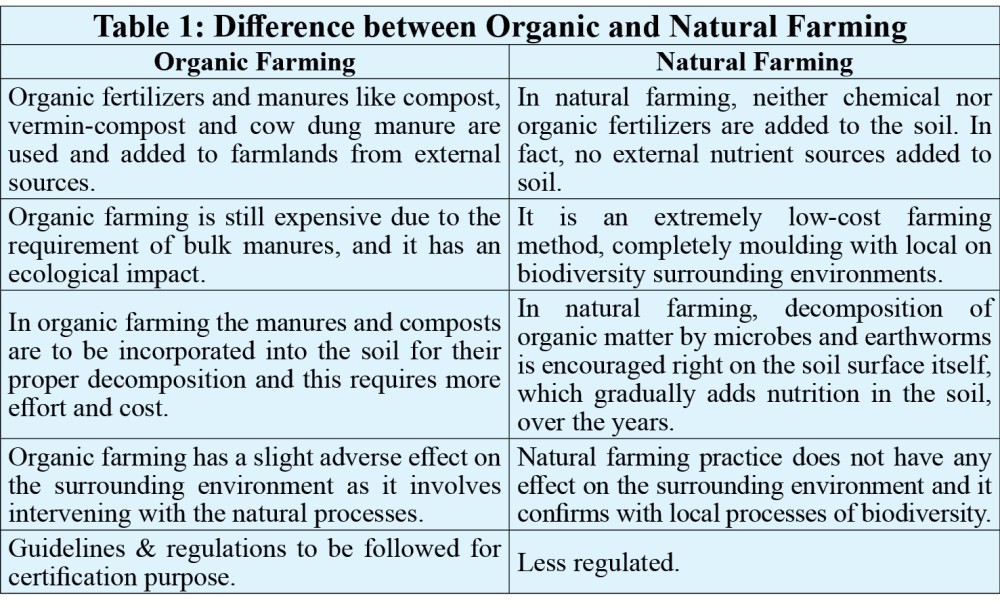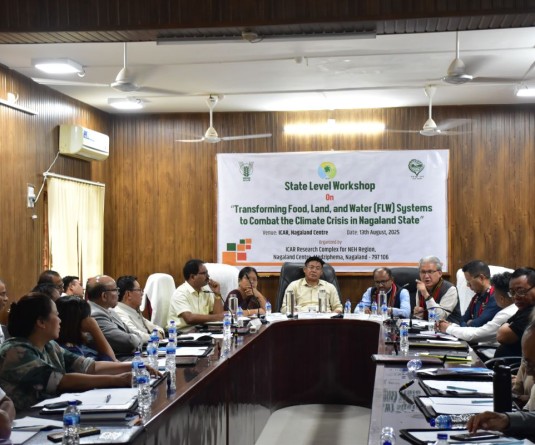
Dr N Khumdemo Ezung
Chief Technical Officer, KVK Kiphire; ICAR for NEH Region, Nagaland Centre
Introduction
The world has witnessed a long succession of agriculture to reach the present-day farming through the changes in practices adopted in doing so. In India also Agriculture has witnessed several technological advancements and changes. With the introduction of ‘Green Revolution’ (GR) technologies there has been intensification of agriculture which transformed India from food scarce country to food surplus. At the same time, it led to adverse effects like, soil degradation, biodiversity losses, rising cost of cultivation, etc. With enhanced application of chemical fertilizers and pesticides with stagnating/ declining crop productivity dovetailed with uncertain market conditions and climate change effect resulted into non remunerative agriculture.
As a result, a large number of farmers falling into debt trap and distress in farming sector became pervasive. In due course, organic farming started gaining importance. The world-wide demand for organic food products is on constant rise as organic farming has the potential to emerge an alternative system of farming which not only addresses the quality and sustainability concerns, but also ensures a debt free, profitable livelihood option. In the similar line natural faming is also being thought of for sustainability of soil health and other related aspects.
Natural Farming is a way of chemical free farming based on desi cow and locally available resources, with no chemical fertilizers and pesticides and promotes traditional indigenous practices which give freedom to farmers from externally purchased inputs and is largely based on on-farm biomass recycling with major stress on biomass mulching, use of on-farm desi cow dung-urine formulation; managing pests through diversity, on-farm botanical concoctions and exclusion of all synthetic chemical inputs directly or indirectly and emphasis is given on improving natural nutrient cycling and increase in organic matter in the soil, which can help with climate change resilience and carbon sequestration in soils.
Natural farming: origin and concept
Natural Farming rooted in ancient Indian science, pointing out that “principles of natural farming are rooted in concepts defined by Vriksha yurveda, the ancient Indian Science of plant life.” Natural farming is an ecological farming approach established by MASANOBU FUKUOKA (1913–2008), a Japanese farmer and philosopher was introduced in his 1975 book The One-Straw Revolution. It is also referred to as "THE FUKUOKA METHOD", "THE NATURAL WAY OF FARMING" or "DO NOTHING FARMING". -The title refers not to lack of effort, but to the avoidance of manufactured inputs and equipment. Natural farming philosophy is working with nature to produce healthy food, to keep ourselves healthy, and to keep the land healthy.
Zero-Budget Natural Farming is one of the many methods of natural farming; it was originally introduced by agriculturist Subhash Palekar in the mid-1990s (later known as Subash Palekar Natural Farming). According to the approach, a concoction of natural inputs like cow urine and dung, jaggery, lime, neem among others, are used to improve soil health, nutrients and reduce input costs, among other benefits. Natural Farming encourages use of own seeds and locally available natural fertilizers and synchronization with nature. Natural farming is a system where the laws of nature are applied to agricultural practices.
Natural Farming: features
1. Natural farming is an eco-friendly & sustainable farming which maintains the ecosystem as desired, because it makes all inputs from natural materials, observes the law of nature and respects the rights of crops and animals.
2. Natural farming respects life: believes that respecting the nature of the life is the best way to achieve top quality and yield.
3. Natural farming produces high quality produce as the inputs used are made by farmers.
4. No monetary investment is required for inputs from the market.
5. No place for fertilizers and chemicals.
6. Dependence on hired labour is also reduced to the bare minimum as it discourages intercultural operations.
Components of Natural Farming
1. Bijamrita: Seed treatment using local cow dung, cow urine and little soil from the bund of the farm or land of the farm. This is effective in checking seed borne diseases.
2. Jeevamrita and Ghanajeevamrita: Applying inoculation made of local cow dung and cow urine without any fertilizers and pesticides. It provides nutrients, also acts as catalytic agent which promotes microorganism activity in soil along with increasing activity of earthworm present in soil. It has the capacity to prevent fungal and bacterial plant diseases.
3. Mulching: Activities to ensure favorable micro climate in the soil through increasing air circulation in soil, conserving rain water in soil and controlling weeds. Three types of mulching viz, soil mulching, straw mulching and live mulching are used.
4. Waaphasa: Waaphsa is that microclimate in soil, by which the soil organisms and root can live freely with availability of sufficient air and essential moisture in the soil. In short, it is a mixture of 50 % air and 50 % water vapours in the cavities between two soil particles.
To motivate farmers to adopt chemical free farming and enhance the reach of natural farming, the Government has formulated National Mission on Natural Farming (NMNF) as a separate and independent scheme from 2023-24 by up scaling the Bhartiya Prakritik Krishi Paddati (BPKP) under centrally sponsored scheme- Paramparagat Krishi Vikas Yojana (PKVY). The success of NMNF will require behavioural change in farmers to shift from chemical-based inputs to cow based locally produced inputs and thus requires continuous creation of awareness, training, handholding and capacity building of farmers in the initial years.
Natural farming and organic farming
Although organic farming has become a big movement, it must not be confused with natural farming. First of all, let us understand the principles of natural and organic farming. Ever wondered how so many trees in forests grow fruits, flowers without any help from chemical or organic fertilisers? The answer is “Mother Nature”. This is exactly what natural farming does, it follows the law of nature. It is an ecological farming approach that grows crops without external inputs such as chemical fertilisers, pesticides, herbicides. It promotes biodiversity, soil health, plant and animal health, while minimising human interventions. On the other hand, though organic farming avoids the use of synthetic chemicals, it has more specific guidelines to be followed to be certified as organic. This kind of farming involves using natural inputs like compost, cover crops and natural pest control methods. Organic farming also emphasises the importance of soil health and biodiversity.
Though both the methods of farming appear to have some commonalities, they are two different approaches. Difference between organic and natural farming is given in Table 1.
Conclusion
Natural Farming (NF) addresses major concerns of farmers of rising cost of production envisaging ecological or regenerative agriculture approaches under which application of any kind of chemicals to soil are prohibited. It relies more on soil biology by encouraging multi-cropping, round-the-year soil cover, addition of formulation made up of cow dung and urines to trigger the microorganisms in the soil system. However, for the Natural Farming to be successful, concerted effort needs to be done by all the stakeholders for creating wide awareness about the system of farming. Research based support system needs to be created for different ecological condition so as to ensure adoption of the same.






